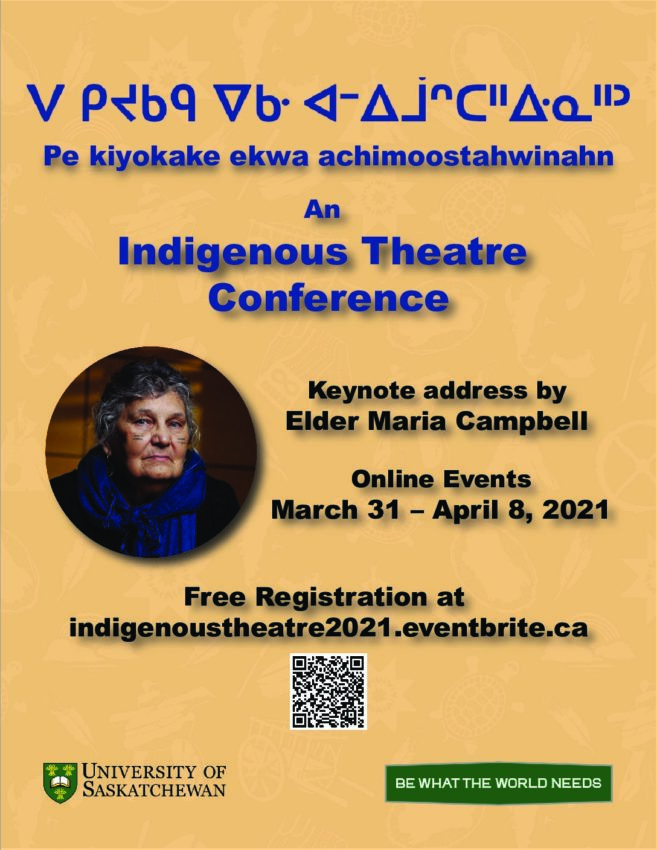
The Indigenous Theatre Conference aims to open opportunities for conversations, learning and building connections for artists, educators and students.
Deneh’Cho Thompson, assistant professor at the University of Saskatchewan and co-ordinator of the wîcêhtowin Theatre program, is an organizer for Pe kiyokake ekwa achimoostahwinahn, the first Indigenous theatre conference at the U of S. The conference aims to create space for Indigenous artists amidst the challenges of the pandemic.
“We are trying to create a digital space for people to see each other’s faces and have conversations, and interact in ways that we usually do in person,” said Thompson.
Thompson says that the drama department wants to focus on Indigenous scholarship, sharing people’s knowledge and creating changes both in the university and across the country. The event had to be restructured after the pandemic hit, since the department needed to adjust the conference’s delivery mode, with the goal to still give a platform to Indigenous scholars, artists and practitioners remotely.
Panelists across the country are taking part in the 10-day event. This will ensure that everyone has a chance to attend and participate with the event, Thompson says.
“We tried to space it out as best as we can so that people have the capacity to engage,” Thompson said.
Thompson says that with Indigenous theatre scholarship being relatively young, the number of scholars and practitioners is limited.
“There is a fairly small circle of people to contact… We are always trying to expand the circle to include more people,” Thompson said.
Artistic Sovereignty is one of the panels to be held during the conference, on the topic of how Indigenous people can make art that resists or rejects colonial narratives.
“We have someone looking at pedagogy,” Thompson said. “There is someone talking about … how do we create the images or own the images of ourselves, as opposed to being subjected to assumptions of what we’re meant to look like or what we are meant to make art of.”
Thompson is also a part of the Indigenous Theatre Education panel on the topic of theatre education. The panel will provide the opportunity for people to have conversations on their practice as educators in order to advance Indigenous theatre.
“I think there are a number of Indigenous theatre educators across the country who are doing all sorts of wonderful work at universities … but the trick is we don’t often get to be in conversation with each other,” Thompson said.
In his experience as the director of the play Gordon Winter, Thompson has dealt with the topics of race and media.
“I’m trying to tease out notions of how we interact with screen-based media and how that might affect the story’s intent,” said Thompson.
Gordon Winter will be presented at the event, followed by a Talkback session discussing the original reception of the play, its controversy and how it has changed over time.
Thompson says that his past experiences and the moments where he felt seen and validated as an Indigenous artist are what inspire him to continue doing the work he does with students today.
“I want to create space in the university for the next generation… I want there to be mentors where I didn’t have them,” said Thompson.
Thompson says he is excited about the conference and the growing theatre movement in Canada.
“As we progress, our conversations are getting more and more sophisticated… There is huge talent out there and I really hope to create a little visibility,” said Thompson.
—
Kristine Jones | Culture Editor
Graphic: Supplied | Deneh’Cho Thompson
Leave a Reply